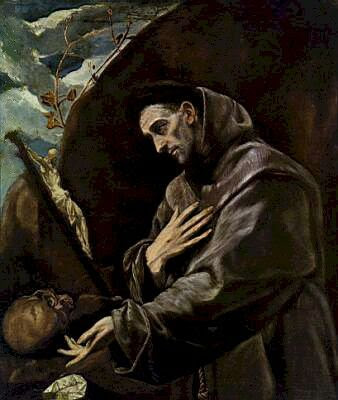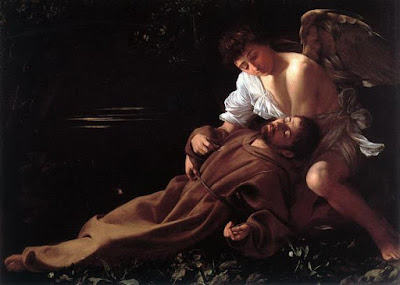On this day, you can sing
the hymns for Apostles & Evangelists or the hymns for
the Feast of One Martyr. From
Hymn melodies for the whole year from the Sarum services books:
On the Feast of One Martyr:
1st Ev. & Matt.: Martyr Dei, qui unicum
At 1st Ev. (except in Xmas & Paschal-tides) ... ... 25
At 1st Ev. in Xmas-tide & (М.. throughout the year (except in Paschal-tide ) ... ... 26
During Paschal-tide (1st Ev. & М.) ... ... 39
On Simple Feasts of the lowest class throughout the year (1st Ev. & M.) ... ... 6 or 76
Lauds & 2nd Ev.: Deus, Tuorum Militum
At L. (except in Xmas & Paschal-tides) ... ... 25
At 2nd Ev. (& L. when no 2nd Ev.) ... ... 49
During Xmas-tide (L. & 2nd Ev.) ... ... 27
During Paschal-tide (L. & 2nd Ev.) ... ... 39
On Simple Feasts of the lowest class throughout the year (L.) ... ... ... 40
The Latin words for
Martyr Dei, qui unicum are
these:
Martyr Dei, qui (quæ) unicum
Patris sequendo Filium,
victis triumphas hostibus,
victor (victrix) fruens cælestibus.
Tui precatus munere
nostrum reatum dilue,
arcens mali contagium,
vitæ repellens tædium.
Soluta sunt iam vincula
tui sacrati corporis;
nos solve vinclis sæculi,
amore Filii Dei.
Honor Patri cum Filio
et Spiritu Paraclito,
qui te corona perpeti
cingunt in aula gloriæ.
I do not have much else on this hymn right now, although
this note at Google Books' Liturgical Prayer says: "The hymn
Martyr Dei, qui unicum seems to be a continuation of
Deus tuorum militum" - that is, the hymn for Lauds and 2nd Evensong, the discussion of which follows. Again, not unusual; many hymns are broken up in this way to serve several purposes.
[
EDIT: I have found
an English translation of this hymn, at Cyberhymnal, where it is called "
Martyr of God, whose strength was steeled." Cyberhymnal notes that the hymn is by an: "Unknown author, 10th Century (Martyr Dei qui unicum); translated from Latin to English by Percy Dearmer in The English Hymnal (London: Oxford University Press, 1906), number 180."
Martyr of God, whose strength was steeled
To follow close God’s only Son,
Well didst thou brave thy battlefield,
And well thy heavenly bliss was won!
Now join thy prayers with ours, who pray
That God may pardon us and bless;
For prayer keeps evil’s plague away,
And draws from life its weariness.
Long, long ago, were loosed the chains
That held thy body once in thrall;
For us how many a bond remains!
O Love of God release us all.
All praise to God the Father be,
All praise to Thee, eternal Son;
All praise, O Holy Ghost, to Thee
While never ending ages run.
If I find an audio recording of this hymn, I'll return and post it. Meanwhile, you can use the score for hymn #25 above, which
sounds like this (mp3) and looks like this:
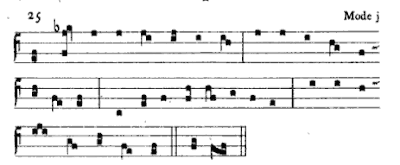
]
Deus tuorum militum can be found at "Early christian hymns," listed as a "
Vesper hymn, for the feast of a martyr."
The Lutheran Liturgical Prayer Brotherhood offers
this hymn (mp3), "O God Thy Soldiers Crown and Guard," as a "Hymn about the Martyrs (male)."
Here are the words to this, noted as from an unknown author in the sixth century, with a translation by J.M. Neale:
O God, thy soldiers' crown and guard,
and their exceeding great reward;
from all transgressions set us free,
who sing thy martyr's victory.
The pleasures of the world he spurned,
from sin's pernicious lures he turned;
he knew their joys imbued with gall,
and thus he reached thy heavenly hall.
For thee through many a woe he ran,
in many a fight he played the man;
for thee his blood he dared to pour,
and thence hath joy for evermore.
We therefore pray thee, full of love,
regard us from thy throne above;
on this thy martyr's triumph day,
wash every stain of sin away.
O Christ, most loving King, to thee,
with God the Father, glory be;
like glory, as is ever meet,
to God the holy Paraclete.
(LLPB also offers two other hymns for martyrs:
O Glorious King of Martyr Hosts (mp3) and
The Noble Deeds of Saints (mp3); both of these have been discussed
elsewhere, as used on the feast days of
several martyrs.)
As you can see, there are many possible tunes for use with this hymn, depending on the liturgical season; I am in a hurry just now so will let you look them up in
Hymn melodies for the whole year. Perhaps I'll come back later and post them all individually.
Here's today's entry at
Episcopal Café's Speaking to the Soul: "The Liturgy of St. James":
Daily Reading for October 23 • St. James of Jerusalem, Brother of our Lord Jesus Christ, and Martyr, c. 62
Then the Priest signs the Gifts, bows and says:
We make this offering to you, Master, for your holy places also, which you glorified by the divine Epiphany of your Christ, and by the visitation of your all-holy Spirit, especially for the holy and glorious Sion, the mother of all the Churches; and for your holy, Catholic and Apostolic Church throughout the whole inhabited world. Richly bestow on it now too, Master, the gifts of your all-holy Spirit.
People (quietly, many times, as the Priest prays): Remember, Lord our God.
Remember, Lord, also our holy fathers and bishops in your Church, who throughout the inhabited world rightly proclaim the word of truth. . . .
Remember, Lord, the honourable order of presbyters here and everywhere, the diaconate in Christ, all the rest of the ministers, every order in the Church and our brotherhood in Christ and the whole Christ-loving people.
Remember, Lord, the deacons who stand round your holy altar and them a life without reproach, preserve their diaconate unstained and grant them good standing.
Remember, Lord, those who travel by land, sea and air, Christians who live far from home, those in bondage and prisons, those in captivity and exile, those in mines and in tortures and bitter slavery, our fathers, mothers and brethren, and a peaceful return for each of them to their own homes.
Remember, Lord, those in old age and incapacity, the sick, the suffering, those troubled by unclean spirits, and for their speedy healing from God and for their safety and salvation.
Remember, Lord, those who pass their lives in virginity, purity and asceticism, and in holy wedlock, and for our venerable fathers, mothers and brethren who struggle on mountains, in caves, and in the hollows of the earth, and Orthodox communities in every place and for our community in Christ in this place.
Remember, Lord, all for their good. Have mercy on all, Master. Be reconciled with us all. Give peace to the multitudes of your people. Disperse scandals; put an end to wars; ends the schisms of the churches; speedily dissolve the uprisings of heresies; throw down the pride of the nations; exalt the horn of Christians; grant us your peace and your love, O God, our Saviour, the hope of all the ends of the earth.
Remember, Lord, seasonable weather, gentle showers, fair dews, abundant harvests, perfect seasons and the crowning of the year with your goodness. For the eyes of all hope on you, and you give them their food in due season; you open your hand and fill every living being with your good pleasure.
Remember, Lord, those who have brought and those who bring offerings in the holy Churches of God, those who remember the poor, and those who have asked us to remember them in our prayers.
Also be pleased to remember, Lord, those too who have brought offerings today for your holy altar, and those for whom each has brought them, or whom each one has in mind, and those whose names are now read to you. And he commemorates those whom he wishes of the living. . . .
Also be pleased to remember, Lord, those who have been well-pleasing to you from the beginning of time, generation by generation, holy Fathers, Mothers, Patriarchs, Prophets, Apostles, Martyrs, Confessors, Teachers, Ascetics, and every righteous spirit, made perfect in faith.
Deacon: And for the peace and stability of the whole world and of the holy Churches of God, and those for whom each has made offerings or whom they have in mind and for the people here present, and for all people.
Priest (aloud): Through whom for us and for them, for you Master are a good God and a Master who loves humankind:
People: Remit, forgive, pardon, O God, our transgressions, voluntary and involuntary, in knowledge and in ignorance.
Priest (aloud): By the grace, compassion and love for humankind of your Christ, with whom you are blessed and glorified with your all-holy, good and life-giving Spirit, now and for ever, and to the ages of ages.
People: Amen.
Excerpts of prayers offered with the gifts in the Divine Liturgy of St James, which until recently was only celebrated on the island of Zakynthos on his feast on 23 October and in Jerusalem on the Sunday after Christmas, but is today celebrated in an increasing number of Orthodox churches. It was the ancient rite of Jerusalem, as the Mystagogic Catecheses of St Cyril of Jerusalem imply. The entire text may be found at http://web.ukonline.co.uk/ephrem/lit-james.htm.
Here's another piece on this liturgy, from CCEL.
Here is a page of music from this liturgy at "Divine Music Project," from
St. Anthony's Greek Orthodox Monastery in Arizona. It seems to be a big deal to download the necessary software to open the audio files (
.MUS files, a Finale extension) - and they are only MIDI-type music files anyway, so I will put this off till later, myself. There are PDFs of the music, though, as well.
Here, though, is an mp3 the from
Byzantine Catholic Church in Slovakia of "
I Love Thee, O Lord," a Canticle from this liturgy. It's a short piece, and comes from Psalm 17:2-3. Gorgeous, too.
The hymn "
Let All Mortal Flesh Keep Silent" orginally came from this liturgy, apparently:
An ancient chant of Eucharistic devotion based on the verses taken from Habakkuk 2:20
"Let all the earth keep silence before Him"
taken from one of the books of the 12 minor prophets of Bible. The original was composed in Greek as a Cherubic Hymn for the Offertory of the Divine Liturgy of St James in the fourth Century AD, with local Churches adopting arrangements in Syriac and English transcription. In modern times, the Ralph Vaughn Williams arrangement of a translation from the Greek by Gerard Moultrie to the tune of Picardy, a French medieval folk melody, popularized the hymn among Christian congregations that worship liturgically.
Here's an mp3 of the Byzantine Catholic version of Let All Mortal Flesh Keep Silent, again from the Byzantine Catholic Church in Slovakia - and again, just lovely. Interestingly, it does have that same opening motif as
Picardy, and actually has some similar feeling! I bet that's why RVW picked the French melody, that old rascal.
Here's
Mission St. Clare on James of Jerusalem.
James of Jerusalem is referred to in the New Testament as the brother of Our Lord Jesus Christ.
He was for many years the leader of the Christian congregation in Jerusalem, and is generally supposed to be the author of the Epistle of James, although the Epistle itself does not state this explicitly.
James is mentioned briefly in connection with Jesus' visit to Nazareth (M 13:55; P 6:3).
We are told that Jesus' brothers did not believe in Him (J 7:2-5), and from this, and from references in early Christian writers, it is inferred that James was not a disciple of the Lord until after the Resurrection.
Paul, listing appearances of the Risen Lord (1 Cor 15:3-8), includes an appearance to James.
Peter, about to leave Jerusalem after escaping from Herod, leaves a message for James and the Apostles (A 12:17).
When a council meets at Jerusalem to consider what rules Gentile Christians should be required to keep, James formulates the final consensus (A 15:13-21).
Paul speaks of going to Jerusalem three years after his conversion and conferring there with Peter and James (G 1:18-19), and speaks again of a later visit (perhaps the one described in A 15) on which Peter, James, and John, "the pillars," placed their stamp of approval on the mission to the Gentiles (G 2:9).
A few verses later (G 2:11-14), he says that messengers from James coming to Antioch discouraged Jewish Christians there from eating with Gentile Christians. (If this is refers to the same event as A 15:1-2, then Paul takes a step back chronologically in his narration at G 2:11, which is not improbable, since he is dictating and mentioning arguments and events that count as evidence for his side as they occur to him.)
On his last recorded visit to Jerusalem, Paul visits James (others are present, but no other names are given) and speaks of his ministry to the Gentiles (A 21:18).
Outside the New Testament, James is mentioned by the Jewish historian Josephus, who calls him "the brother of Jesus the so-called Christ," and reports that he was much respected even by the Pharisees for his piety and strict observance of the Law, but that his enemies took advantage of an interval between Roman governors in 62 AD to have him put to death. His death is also reported by the second-century Christian writer Hegesippus.
Numerous references in early Christian documents show the esteem in which he was held in the early Church.
There appear to be at least three persons named James mentioned in the New Testament, and possibly as many as eight.
Check out
Fr. Haller's icon of St. James; it's really great.
Here's a different one:























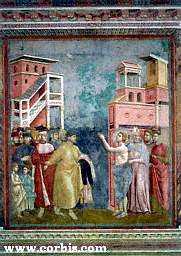 Francis was born in 1182, the son of a wealthy cloth merchant. His early years were frivolous, but an experience of sickness and another of military service were instrumental in leading him to reflect on the purpose of life. One day, in the church of San Damiano, he seemed to hear Christ saying to him, "Francis, repair my falling house." He took the words literally, and sold a bale of silk from his father's warehouse to pay for repairs to the church of San Damiano. His father was outraged, and there was a public confrontation at which his father disinherited and disowned him, and he in turn renounced his father's wealth--one account says that he not only handed his father his purse, but also took off his expensive clothes, laid them at his father's feet, and walked away naked. He declared himself "wedded to Lady Poverty", renounced all material possessions, and devoted himself to serving the poor. In his day the most dreaded of all diseases was something known as leprosy. (It is probably not the same as either the modern or the Biblical disease of that name.) Lepers were kept at a distance and regarded with fear and disgust. Francis cared for them, fed them, bathed their sores, and kissed them. Since he could not pay for repairs to the Church of San Damiano, he undertook to repair it by his own labors. He moved in with the priest, and begged stones lying useless in fields, shaping them for use in repairing the church. He got his meals, not by asking for money so that he might live at the expense of others, but by scrounging crusts and discarded vegetable from trash-bins, and by working as a day laborer, insisting on being paid in bread, milk, eggs, or vegetables rather than in money. Soon a few companions joined him. Dante in his Paradiso has Aquinas say of him:
Francis was born in 1182, the son of a wealthy cloth merchant. His early years were frivolous, but an experience of sickness and another of military service were instrumental in leading him to reflect on the purpose of life. One day, in the church of San Damiano, he seemed to hear Christ saying to him, "Francis, repair my falling house." He took the words literally, and sold a bale of silk from his father's warehouse to pay for repairs to the church of San Damiano. His father was outraged, and there was a public confrontation at which his father disinherited and disowned him, and he in turn renounced his father's wealth--one account says that he not only handed his father his purse, but also took off his expensive clothes, laid them at his father's feet, and walked away naked. He declared himself "wedded to Lady Poverty", renounced all material possessions, and devoted himself to serving the poor. In his day the most dreaded of all diseases was something known as leprosy. (It is probably not the same as either the modern or the Biblical disease of that name.) Lepers were kept at a distance and regarded with fear and disgust. Francis cared for them, fed them, bathed their sores, and kissed them. Since he could not pay for repairs to the Church of San Damiano, he undertook to repair it by his own labors. He moved in with the priest, and begged stones lying useless in fields, shaping them for use in repairing the church. He got his meals, not by asking for money so that he might live at the expense of others, but by scrounging crusts and discarded vegetable from trash-bins, and by working as a day laborer, insisting on being paid in bread, milk, eggs, or vegetables rather than in money. Soon a few companions joined him. Dante in his Paradiso has Aquinas say of him: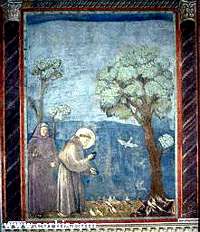 Back in Italy and neighboring countries, the Order was suffering from its own success. Then, as now, many persons were deeply attracted by Francis and his air of joy, abandonment, and freedom. What is overlooked is that these were made possible only by his willingness to accept total poverty, not picturesque poverty but real dirt, rags, cold, and hunger, and lepers with real pus oozing from their sores and a real danger of infection. Many idealistic young men were joining the Order in a burst of enthusiasm and then finding themselves not so sure that such extremes of poverty were really necessary. When there were only a few friars, they were all known to Francis personally, and the force of his personality kept the original ideals of the Order alive in them. Now that the Order was larger, this was no longer enough. In 1220 Francis resigned as minister-general of the Order, and in 1221 he agreed to a new and modified rule, which he did not approve, but could not resist. He died on 4 October 1226. The Franciscan split into the Conventual Franciscans, who held a limited amount of property in common, and the Spiritual Franciscans, who disavowed all property. They taught that Christ and the twelve apostles had held no property, singly or jointly. This view offended those who held property, and was declared to be heretical (proof text, J 18:10; Jesus said to Peter, "Put up THY sword...."). In 1318, several Spiritual Franciscans were burned at the stake in Marseilles.
Back in Italy and neighboring countries, the Order was suffering from its own success. Then, as now, many persons were deeply attracted by Francis and his air of joy, abandonment, and freedom. What is overlooked is that these were made possible only by his willingness to accept total poverty, not picturesque poverty but real dirt, rags, cold, and hunger, and lepers with real pus oozing from their sores and a real danger of infection. Many idealistic young men were joining the Order in a burst of enthusiasm and then finding themselves not so sure that such extremes of poverty were really necessary. When there were only a few friars, they were all known to Francis personally, and the force of his personality kept the original ideals of the Order alive in them. Now that the Order was larger, this was no longer enough. In 1220 Francis resigned as minister-general of the Order, and in 1221 he agreed to a new and modified rule, which he did not approve, but could not resist. He died on 4 October 1226. The Franciscan split into the Conventual Franciscans, who held a limited amount of property in common, and the Spiritual Franciscans, who disavowed all property. They taught that Christ and the twelve apostles had held no property, singly or jointly. This view offended those who held property, and was declared to be heretical (proof text, J 18:10; Jesus said to Peter, "Put up THY sword...."). In 1318, several Spiritual Franciscans were burned at the stake in Marseilles.